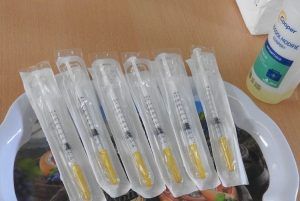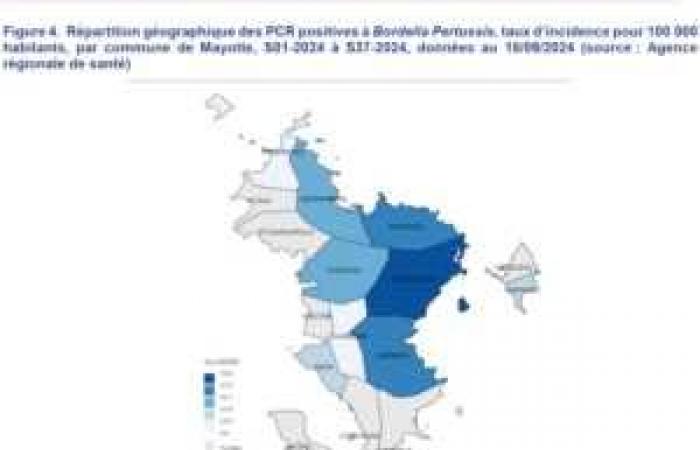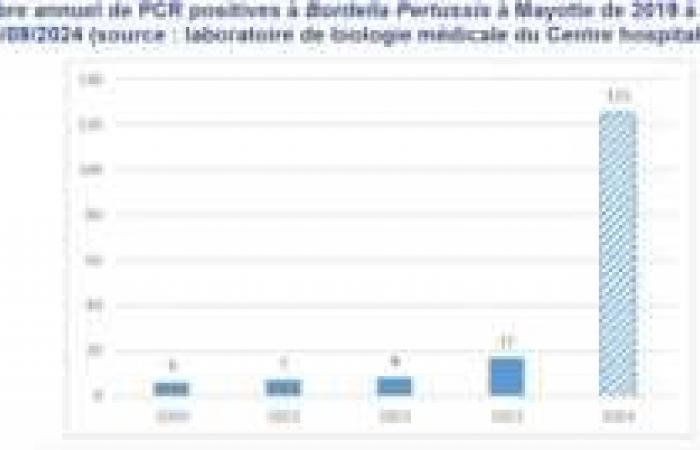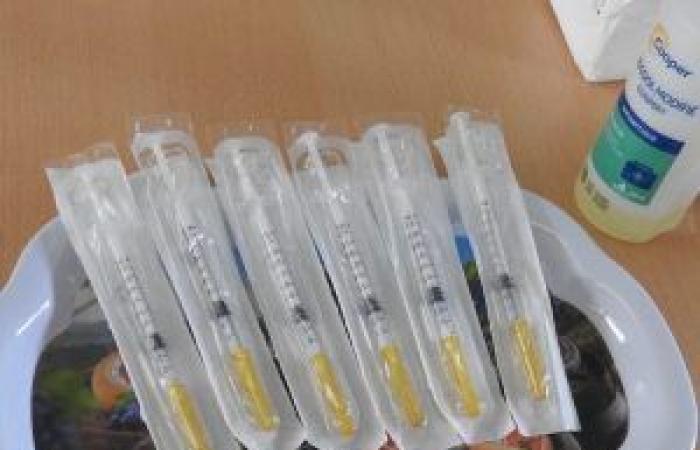After cholera, it is now whooping cough that seems to have “settled” in our territory for several weeks. “This resurgence is part of a national and European context in 2024 of resurgence at a high level of intensity of whooping cough”, indicates Public Health France, in its Whooping Cough Surveillance Bulletin (Mayotte edition), dated September 19, 2024.
Indeed, the increase in the number of whooping cough cases in Mayotte has mainly been observed since the beginning of June 2024 (23 cases) and 55 cases were recorded in August alone. However, in week 37, 1 case was reported, seeming to confirm the decrease in the number of cases observed in W35 and W36.
In our territory, the epidemic mainly concerns children under 1 year old (69 cases, 55%), then children from 1 to 3 years old (22 cases, 18%), 20 (16%) cases are reported in adults aged 18 and over (maximum age: 66 years). Two deaths were reported in unvaccinated infants and their mothers, no new deaths reported in S36 and S37.
According to the ARS of Mayotte, the cases are mainly distributed in the north and east of the department with an incidence rate of 72.8 cases per 100,000 inhabitants in Mamoudzou, 37.9/100,000 inhabitants in Dembeni and 37.3/100,000 inhabitants in Koungou. In addition, 20 home visits were carried out by the Department of Health Security and Emergencies (Désus) of the ARS Mayotte, allowing 118 catch-up vaccinations to be carried out and 84 antibiotic prophylaxis to be prescribed.
Also, regarding vaccination, the general population vaccination coverage survey conducted in 2019 estimated fairly good vaccination coverage among children aged 24-59 months against whooping cough of 92.2% but which was below the herd immunity threshold set at 95%.
“In this national context of a resurgence of whooping cough cases, with a particularly high number of deaths among newborns and infants in France, the High Authority for Health (HAS) was contacted by the Ministry of Health. It reiterates that vaccination of pregnant women is the most effective way to protect newborns and infants before they can be protected by their own vaccination. It also recommends a booster vaccination for all people who may be in close contact with newborns and infants under 6 months old, if the last injection received was more than 5 years ago,” writes Public Health France in its Whooping Cough Surveillance Bulletin.
In addition, the HAS recommends that anyone in close contact with a newborn and/or infant under 6 months in a family or professional setting receive a booster if the last whooping cough vaccine was given more than 5 years ago. “This booster dose should be administered to healthcare and early childhood professionals in close contact with newborns or infants under 6 months. As a reminder, among these professionals, boosters are currently recommended every 20 years. It should also be administered to the newborn’s entourage (parents, siblings, grandparents and other people likely to be in close and lasting contact with the infant during the first six months) as part of the so-called “whooping cough” strategy. cocooningunless the mother was vaccinated during pregnancy at least one month before giving birth. Studies suggest that vaccine efficacy would fade rapidly from 5 years after the last dose, becoming insufficient to guarantee protection against infection.
What are the preventive measures?
Prevention of whooping cough is based on vaccination and non-vaccination control measures. The vaccination policy against whooping cough in France aims to reduce severe forms, hospitalizations and deaths linked to whooping cough, which mainly occur in infants under 6 months of age.

In addition, vaccination is mandatory for infants born from 1 January 2018 at the age of 2 months, 4 months with boosters at 11 months, 6 years and 11-13 years and up to adulthood (25 years with the possibility of catching up up to 39 years). Vaccination is strongly recommended for pregnant women, from the second trimester of pregnancy, with priority given to the period between 20 and 36 weeks of amenorrhea. In the absence of vaccination of the mother during pregnancy, vaccination of the mother postpartum and of people likely to be in close contact with the infant during the first 6 months of life is recommended (so-called cocooning strategy).
Vaccination is also recommended for immunocompromised people; healthcare professionals (including in nursing homes for dependent elderly people); people working in close and repeated contact with infants under 6 months old; students in medical and paramedical fields; early childhood professionals including childminders and people who regularly babysit. Finally, for healthcare and early childhood professionals, the 25, 45 and 65 year-old boosters must now include the pertussis valence.








